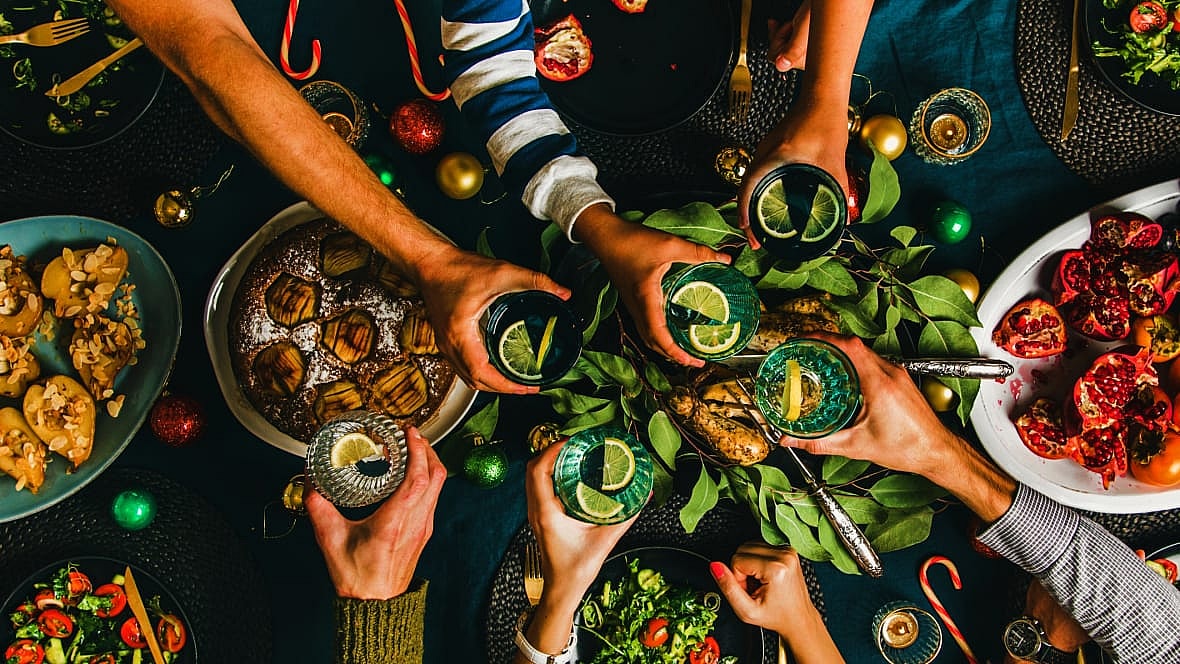It’s no secret that people expect to gain weight over the holidays, although there isn’t a clear answer on how much. In one survey, Americans said they expected to gain eight pounds. But a study in the New England Journal of Medicine puts potential weight gain at as little as about one pound.
Whether it’s one pound or eight—or something in between—Americans tend to fixate on excess weight.
Holiday treats — cookies, cakes, pies, and side dishes like stuffing and macaroni and cheese — tease and tempt us with their deliciousness. (Trust me, I know; I’m cooking many of those treats for my own family as well as writing about them here.) But if you’re concerned about weight gain, there are ways you can enjoy those seasonal indulgences without putting on extra pounds, whatever the number, and ultimately have a healthier holiday. These tips should help.

Fill a smaller plate
I’ve started using this trick, and it’s helped me control my food intake. An average dinner plate in the 1960s measured 8.5 to 9 inches in diameter and held about 519 calories, according to CookingLight. Today, dinner plates measure 11 to as much as 12 inches in diameter and hold more than 700 calories. When you consider three meals a day, plate size accounts for an additional 5,000 calories a week. It takes 3,500 calories to gain one pound. So, if you’re worried about waist size, start with looking at your plate size.
Even with the smaller size, I don’t leave the table hungry. I feel fulfilled and not stuffed, and that’s also a benefit of eating in moderation. I dislike that bloated feeling that comes from overeating. So the smaller plate size not only helps me reduce my caloric intake but makes me feel better.
Savor your flavors
Americans eat too fast— no doubt about it. The Bureau of Labor Statistics time use survey shows Americans spent just over one hour daily eating and drinking. That’s less than half the time people in France, Italy, and Spain take to enjoy their food and far less than South Koreans, Germans, and Chinese. When I’ve been to Europe, servers in restaurants have a common refrain: What’s the rush?
WebMD notes that when we eat too fast, our body doesn’t know we’ve eaten enough. It takes approximately 20 minutes for the brain to send signals telling the body, hey, you’re full! You’ll not only enjoy your food when you slow down, but your body will better understand when you don’t need to eat anymore.
Don’t eat late at night
Who doesn’t like a late-night snack, especially with all of that good food making eyes at you? You might like a midnight snack, but odds are they don’t like you. The Cleveland Clinic recommends no eating within three hours of bed so you can properly digest your food. Eating late can exacerbate or even induce health issues, including acid reflux and obesity. Going to bed on a full or partially full stomach also can interfere with your sleep cycle and result in a night of tossing and turning. Is all that worth that extra piece of pie?
Eat more veggies
Obvious but tricky. The USDA recommends that a “rainbow” of vegetables — red, green, orange, yellow, purple, and blue — comprise half of your plate. These veggies should be raw or steamed, so a green bean casserole smothered in canned mushroom soup or a sweet potato casserole doused with sugar doesn’t qualify. Of course, if half of your plate contains vegetables, that leaves less room for side dishes. That’s an easy fix. Just take less. You don’t need a half cup of every side on the table. Take a tablespoon full or so and savor it.
Don’t go for gimmicks
There are all kinds of diet supplements and gimmicks that don’t work. The USDA’s Weight Loss and Nutrition Myths lists some of them. You might lose a little weight quickly with a fad diet, but most people put the pounds back on in short order—and then some. You won’t easily lose weight by skipping a meal, but you will be hungry and might consume more the next time you eat.
To lose weight, you need to burn more calories than you take in. That’s it. Eating smaller portions slowly, loading up on veggies, and skipping late-night eating late can help.
It’s not as easy as pie, but it’s a recipe for a healthier holiday season.

Ray Marcano is a longtime, award-winning journalist who has written and edited for some of the country’s most prominent media brands. He’s a former national president of the Society of Professional Journalists, a two-time Pulitzer juror, and a Fulbright Fellow.
TheGrio is FREE on your TV via Apple TV, Amazon Fire, Roku, and Android TV. TheGrio’s Black Podcast Network is free too. Download theGrio mobile apps today! Listen to ‘Writing Black‘ with Maiysha Kai.

